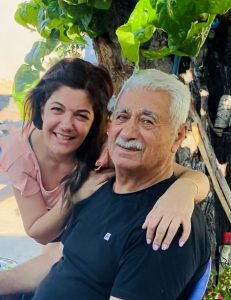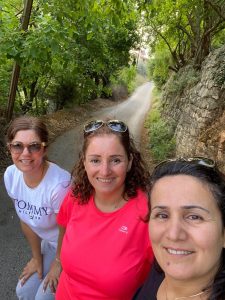Return to Syria – An emotional journey home
Former Syrian refugee Norma Medawar recently returned to her homeland for the first time since she left amid a devastating civil war in 2014
My first visit home to Syria since I left eight years ago in the middle of the civil war was an overwhelming mix of emotions.
I felt happiness at seeing my father, I felt nostalgic about the sights and smells of my homeland so familiar from my childhood.
But I also felt sadness at the conditions in which so many people are living; and concern about the future of the country.
I spent six weeks in Syria, visiting family and friends and revelling in the ancient sites and rich culture that I am so passionate about. It was an exciting and wonderful but also confronting experience.
I flew in to Beirut in early June and caught a taxi to my village just across the border in Syria.
The atmosphere in Beirut was bleak. The people I met were gloomy and unfriendly. People are obviously suffering from the economic situation in Lebanon, particularly since the devastating explosion in August 2020.
I had hired a taxi from my village to come and pick me up from Beirut. It was a six hour drive and the area was safe but I was still super worried and my driver had to pay bribes along the way to make sure we had a smooth trip.
When we crossed the border, it was overwhelming. It seemed like the air smelt different and I thought to myself ‘yes, this is what I have been missing’.
 It was emotional to see my dad after eight years. He is 86 and in good health and I loved spending time with him.
It was emotional to see my dad after eight years. He is 86 and in good health and I loved spending time with him.
I went to Damascus to deliver some things that friends in Australia had asked me to pass on to family members. The centre of the old city is as beautiful as ever and undamaged but parts of the city’s outer suburbs still show the devastating effect of the war with empty streets and derelict buildings.
I saw even worse damage in the city of Homs, where there was a siege for three years. Entire districts have been destroyed.
In Damascus and across the country there are electricity shortages with power on only one hour in five. This can be hard for people when it gets hot – and you can hear the noise from diesel generators everywhere.
There are also shortages of petrol, gas and bread and many Syrians are struggling because of rising prices. The average monthly salary is just $A35. I read that 90 per cent of people in Syria are living below the poverty line.
But there is also a divide between places where the war was remote – which seem wealthy with hotels and bars everywhere – and other places badly affected by the war where there is poverty and homelessness. And you see children aged just 10, 11 or 12 working.
I met a women and her daughter whose son had been killed in the war. She was living on a pension of 60,000 Syrian pounds a month, or $A20. With the cost of living in Syria the way it is, that is not enough to buy food, let alone anything else. I don’t know how she was surviving and she didn’t either.
Despite all this, most Syrians remain resilient and people seem to have gotten used to the way things are.
In Syria things are much more relaxed and people don’t work as long or hard as Australians. They have time to talk to each other, they have more simple lives and most are accepting of their lot.
I was able to switch off too for six weeks and forget about the stress of work or bills. I was planning to continue to study but Zoom is banned in Syria and the internet is not good anyway. So, the biggest worry we had was what was for lunch.
But the other side of that coin was that I noticed than when I left eight years ago, a lot of people were engaged in political discussions and were interested in the future of the country.
Now, sadly, they just talk about gas and electricity shortages and price of everything.
I used to teach English in schools and I met some of my former students. When I saw them I didn’t recognise them at first because they had all grown up. It was an emotionally overwhelming experience.
 I went for walks with some friends around my village just like we used to years ago in happier times.
I went for walks with some friends around my village just like we used to years ago in happier times.
We used to walk in a valley near my village and we went back there to remember those times. The air and the plants still smelled the same.
I remember being very sad when I first left Syria. I didn’t know what would happen to my country or whether my friends would be safe. It was good tom see that they were all OK.
Syria has always been a land of contrasts. Now that contrast is between poverty and devastation – and the beauty and culture of the land.
Some of my most magic moments in Syria were visiting the ancient sites in Damascus, Tartus, Latakia and Busra.
The last time I saw Damascus was before the war when I was still studying. I went back to the same areas and restaurants that I used to go to back then. Visiting these areas, you would not think there had been a war in Syria and, for me, the memories came flooding back.
I would love to take some of my Australian friends to visit these parts of Syria. There are beautiful buildings, amazing food and fascinating history in these places.
And although Australia is now my home, this is the Syria that will always live in my heart.
Norma Medawar












